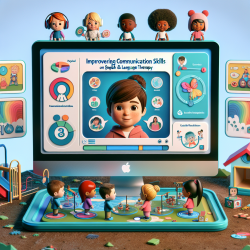As a speech-language pathologist dedicated to leveraging data-driven decisions for optimal child outcomes, it is imperative to stay informed about the latest evidence-based interventions. The research article "Enhancing Pragmatic Language skills for Young children with Social communication difficulties (E-PLAYS-2) trial: study protocol for a cluster-randomised controlled trial evaluating a computerised intervention to promote communicative development and collaborative skills in young children" presents a compelling case for integrating the E-PLAYS program into school-based therapy.
The E-PLAYS intervention utilizes a dyadic computer game to enhance collaborative and communication skills in children aged 5-7 with social communication difficulties (SCDs). This randomized controlled trial aims to establish the effectiveness and cost-effectiveness of the E-PLAYS program, which is delivered by teaching assistants in primary schools.
Key Findings from the E-PLAYS-2 Study
- Improved Pragmatic Language Skills: The study found significant improvements in pragmatic language test scores for children who participated in the E-PLAYS intervention compared to those who did not.
- Enhanced Collaborative Behaviors: Observations indicated that children engaged in E-PLAYS demonstrated better collaborative behaviors during peer interactions.
- Cost-Effectiveness: The intervention proved to be cost-effective, making it a viable option for schools with limited resources.
Implementing E-PLAYS in Your Practice
Based on the outcomes of the E-PLAYS-2 trial, here are some actionable steps to integrate this intervention into your practice:
- Collaborate with Schools: Partner with local schools to introduce the E-PLAYS program. Emphasize its evidence-based nature and potential for improving students' social communication skills.
- Train Teaching Assistants: Provide training sessions for teaching assistants on how to deliver the E-PLAYS intervention effectively. Utilize the comprehensive manual and online support provided by the research team.
- Monitor Progress: Use validated tools such as the Test of Pragmatic Skills (TPS) to assess children's progress pre- and post-intervention. Collect data to ensure the intervention's effectiveness and make data-driven adjustments as needed.
Encouraging Further Research
While the E-PLAYS-2 trial provides robust evidence for the intervention's efficacy, ongoing research is essential to refine and expand its applications. Consider the following research avenues:
- Longitudinal Studies: Conduct long-term studies to assess the sustained impact of E-PLAYS on children's social communication skills and overall development.
- Broader Demographics: Investigate the intervention's effectiveness across diverse populations, including children with varying degrees of SCDs and from different socio-economic backgrounds.
- Integration with Other Therapies: Explore how E-PLAYS can be integrated with other therapeutic approaches to provide a comprehensive support system for children with SCDs.
By implementing the E-PLAYS program and encouraging further research, we can create significant positive outcomes for children with social communication difficulties.
To read the original research paper, please follow this link: Enhancing Pragmatic Language skills for Young children with Social communication difficulties (E-PLAYS-2) trial: study protocol for a cluster-randomised controlled trial evaluating a computerised intervention to promote communicative development and collaborative skills in young children.










